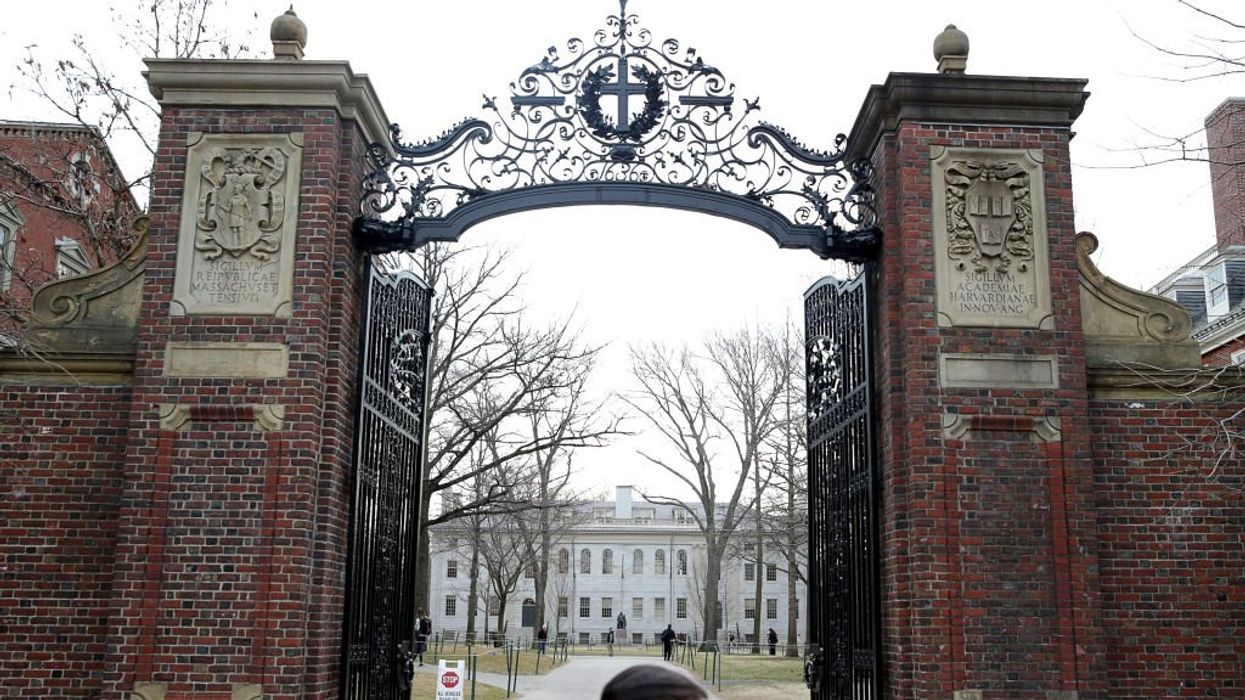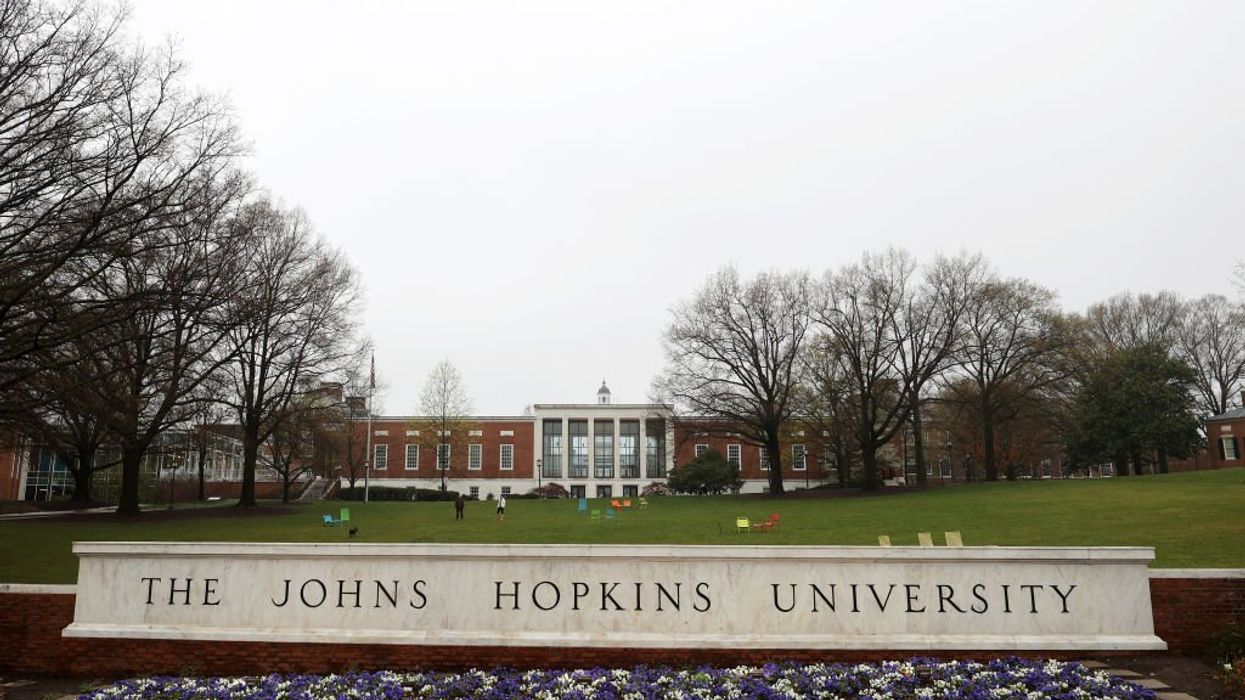DOC: Hi, there. It's Doc Thompson in for Beck. And happy Thanksgiving. Hopefully you'll be getting together with family tomorrow. You'll have some good times. Hopefully you'll count your blessings, truly recognizing how much good there is in the world. We focus on a lot of bad, because it's frustrating. We want the world to be better. And I think most people want better for our fellow citizens, for our fellow man. And most of us are passionate about how to accomplish that. We know things like the Constitution lead to that good. And that's the reason we're so passionate about it.
But somewhere in there, our passion for the right to help people gets twisted just a little bit. Still driven by the same cause. We're willing to be meaner. More combative. And by we, I mean we.
I'm as guilty as anybody. I think if we take a moment and recognize that while we differ on the -- on the method, we still want the same outcome.
I'm not sure our friends on the left give us enough due. I think they really think that somehow we want some sort of society that we really don't want. That we really think oppressing people is good. Really racist, whatever.
But I for one, recognize most people on the left really want good stuff for people. I believe they're misguided. But they want good stuff. About you so on maybe we take a step back as we count our blessings and say, as F we're trying to accomplish (?) good things for the right reasons, let's make sure our methods are still good.
I know how frustrating it is. I've lived this every day. I'm on the air with it. I do the research. I see the social media. I live it every day. And it's really frustrating.
But good is good. Bad is bad. Stay focused on the good. Count your blessings.
Chef Patrick Mosher is with us. Obviously, a big favorite around the holidays. So do you cook on the holidays? Do you cook for your family? Because, you know, a lot of people they don't want to bring their work home. You know, mechanics, they don't work on their own home that often.
PATRICK: No. Cooking for family and friends is really why I do this. I love the restaurant industry and all that goes with that. But it bills down to cooking for the ones you love, absolutely.
DOC: So you still do?
PATRICK: Traditionally, I used to smoke one turkey and roast another one. Because we had such a big crowd. Not so much anymore.
DOC: Not so much anymore.
PATRICK: Yeah.
DOC: It's funny (?) on the holidays, I don't say a word. I'm like a mute. I don't I don't a a word. I get up in the mornings. Okay. Everybody knows that's not true. In fact, it's just the opposite. It's the same stuff here. I'm doing the same stuff at home. Challenging people. Challenging me. Political debate. I actually love good political solid debate. It's family and friends.
PATRICK: It's entertaining.
DOC: Now, when you're out and barbecue, let's say you're at a gathering, (?) cocktail party. And you're introduced to new people. You're mingling. When they find out you're a chef, they ask you, don't they?
PATRICK: Immediately.
DOC: You know, how do you make a --
PATRICK: What's your specialty? And when I say Japanese food, it's interesting. Ah.
DOC: Oh. Because they don't know what to --
PATRICK: White guy. Japanese food. It doesn't compute.
DOC: Plus, most people don't have a go-to Japanese dish.
PATRICK: Other than sushi, they don't know any other Japanese food.
DOC: Or ramen.
PATRICK: Or boxed ramen.
DOC: I can see that. Because doctors (?) they're like, I got this right in the back -- in the shoulder blade. Can you take a --
PATRICK: You know, I have these chest pains. (?) and it's in mean arm. It's in my Czech chest.
DOC: Can you take a look at it?
PATRICK: Yeah. Quick pop (?)
DOC: Look at this. It's down the side of my leg here.
PATRICK: Does this look infected to you?
DOC: Right. You're at dinner, right? That's got to be horrible.
PATRICK: That is -- I do get captured quite often in the food conversation. But --
DOC: It's still probably pretty good. Because you're passionate about it.
PATRICK: Anybody who knows me, knows that I love food. It's been my life for almost 30 years. I love to share knowledge and my passion for the food industry. And teach people that the food -- everybody at some point NBC life, (?), well, it probably would be cool. But it's also expensive.
DOC: Uh-huh.
PATRICK: Exhausting.
DOC: Yeah. If you're worth $450 million and you start a small restaurant and you can lose $100,000 a year, it's probably pretty cool. You get to go in, mingle, you own the restaurant. But when you got to make it balance or profit, that's where it gets tricky, right?
PATRICK: It's a 24/7 business. The average margin I found out (?) the average restaurant makes 4 percent.
DOC: So traditionally, in supermarkets, I'm going way back, the margins was percent, percent and a half. 2 percent?
PATRICK: Yeah. It used to be two. (?) somewhere in the one and a half range.
DOC: At one point in broadcasting, because Telecommunications Act of 1966 said that you could earn more than radio stations that you used to -- I think at one point you could own across the country 17 or 20 or something like that. But you could only own 1:00 a.m. or FM (?) you could own. Per market. Yeah. Ravioli and that's what -- I remember when some of those sold. Some of the stations I worked at. The profit margin was imagine if I told you it was 40 percent, would you think that's pretty good?
SHAWN: Absolutely. Yeah.
DOC: They were 70 percent. (?)
PATRICK: More power to them. I'm obviously in the wrong business.
DOC: The reason why it was 70 percent -- because they didn't pay Doc Thompson. They were like, it's all right. Kid. You can eat ramen, that's fine.
PATRICK: Wait. Where's my paycheck --
DOC: That has all changed somewhat. You just get on. And it works. So we're talking a little bit about Thanksgiving and some of the other things that people search for by state. And some of them seem pretty traditional. Some of them not. Give you some of the other ones. Maybe we'll hit your state here. Indiana, peanut butter cookies. That's kind of a holiday thing. (?)
PATRICK: At least it's a cookie.
DOC: Pin wheels. That's also a cookie. That's in Kansas. Cornbread (?) dressing in Louisiana. That makes sense. Chicken potpie in Maine. Maryland, crab cakes. You know what, I think they search for that all the time in Maryland. That's not a holiday.
PATRICK: That's year around because you can get them cheap.
DOC: Cheesecake in Massachusetts.
PATRICK: And New York. And being from New York, that's pretty common.
DOC: Makes sense. Michigan is chili. Odd choice.
PATRICK: It's really cold up there.
DOC: Minnesota, green bean casserole. Does anybody else have that? That's the only one?
PATRICK: I think so.
DOC: What is chicken spaghetti in Mississippi and also Texas. Chicken spaghetti.
PATRICK: I found a few recipes for that. (?) dish. Which I think you would just substitute turkey for that. But it's made in spaghetti than turkey.
DOC: (?) oven roasted vegetables for Montana. Nevada, peanut butter cookies. New Hampshire, blueberry pie. Thank you, Kal. Blueberry pie. Although, New Hampshire (?) so maybe.
PATRICK: Yeah, it's cold.
DOC: Crab cakes in New Jersey. Pecan pie in New Mexico. Sweet potato pie (?) that's an interesting one. In both Ohio and West Virginia, buffalo chicken dip.
PATRICK: Why not?
DOC: Have you ever had that?
KAL: That stuff is awesome.
DOC: Yeah. And checking account me -- it's shredded chicken with (?)
PATRICK: Mixture of cream cheese, heavy cream, and main ace.
DOC: And it's layered in there?
PATRICK: No, you mix the whole thing (?) served on baguette or toast. Crackers. Whatever you have.
DOC: Oklahoma, pecan pie. I'm sorry. Pecan pie. Whichever. Oregon, bread stuffing. Pennsylvania, also chicken dip. That whole region, Ohio, West Virginia, Pennsylvania. Interesting. You know that he probably just found out about it. (?), yeah, we had that 30 years ago. We're like, have you tried this new thing?
PATRICK: Which is interesting. Because Ohio is typically the test region. I don't understand why. But it's the test region for new foods for the major food companies.
DOC: Yeah. Columbus, in particular. For some reason, demographically, it cuts across all of them. Midwest. But you're also east. You have older (?) just demographically, it's worked for them.
PATRICK: Well, you would think so, but no candidate has won that won the state of Iowa. So I don't understand (?)
DOC: No Ohio. Without winning Ohio. I think that's the history. Anyway --
PATRICK: So maybe you keep Ohio --
DOC: Yeah. (?) pumpkin pie. (?) sausage balls in Tennessee. Just like Alabama.
You've got crescent recipes in Utah. Crescent rolls. Butter nut soup. (?) sugar cookies in Washington. And then shrimp in Wisconsin. And Wyoming pork chops. And then I left out three states.
New Hampshire -- I'm sorry.
KAL: New Hampshire.
DOC: Appreciate you being there, even though I screwed it up. Nebraska, Rhode Island, and Iowa, all search for something that is an odd pick. Kal, have you ever had monkey bread?
KAL: Is that brain?
DOC: No. Monkey bread. Because you're thinking sweetbread.
KAL: Yes. Might as well be bread.
DOC: It's made with only part of the monkey. Not the entire monkey. You're giving me the look. It has nothing to do with monkey.
KAL: Like Rocky Mountain oysters?
PATRICK: Kind of. (?) I was a Boy Scout. Monkey balls instead of monkey bread. But it has nothing to do with monkeys. I don't know where the term came from.
KAL: What is it made of?
DOC: It's cinnamon bread.
PATRICK: Yeah, you are take any kind of a canned biscuit or Doe. You cut it into pieces. (?) and then you make a caramel mixture. So it's sugar and butter in the bottom of like -- like --
DOC: Your roasting pan?
PATRICK: Like an angel food cake pan. A buttoned cake pan. Then you put the (?) you roll them in cinnamon sugar. You put them in there. You bake it. You turn it upside down. I it has this wonderful. (?) it's actually really good.
KAL: That sounds awesome.
DOC: Yeah, it's fantastic or whatever. It seems like an odd pick -- it's not really a breakfast dish. It can be. Not as much as cinnamon rolls.
PATRICK: That you can serve (?) a lot of people with. That doesn't require a lot of preparation.
DOC: This is more, like you said, camping, or late at night, snacky thing. Maybe people are using it for all those. Maybe breakfast or even a desert then it could be used for.
PATRICK: Yeah. I suppose.
DOC: You know what, though, it's probably simple to make for a sweet dessert or whatever you're going to use it for, by comparison. (?)
PATRICK: You don't have to make a Doe.
DOC: You don't have to make the Doe --
PATRICK: It's sugar, butter, (?) those are the ingredients.
DOC: So you're already starting the Doe made. That probably works really well. That's interesting.
PATRICK: It's like the crescent recipes in the other states. Alaska and Utah.











